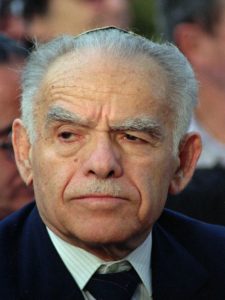 Foreign Minister Yitzhak Shamir defended the government today against charges that it had overreacted to an attempted terrorist incursion last week. He also defended his top aide, David Kimche, for remarking that Israel was interested in seeing a strong Iran.
Foreign Minister Yitzhak Shamir defended the government today against charges that it had overreacted to an attempted terrorist incursion last week. He also defended his top aide, David Kimche, for remarking that Israel was interested in seeing a strong Iran.
Shamir ran into a barrage of criticism from opposition MKs in the Knesset’s Foreign Affairs and Security Committee. Mordechai Gur and Yossi Sarid of the Labor Alignment said the government’s “exaggerated reactions” to the terrorist incident gave the impression that Israel was about to launch an unnecessary attack across the Lebanese border.
Shamir replied that the incident in which three El Fatah terrorists were captured last Saturday, two days after they infiltrated the West Bank from Jordan, could not have been allowed to pass in silence because peoples’ lives might have been at stake. Israel suffered no casualties or damage but the infiltration attempt was denounced by Shamir and other officials as a blatant violation of the ceasefire on the Israel-Lebanon border secured last summer.
Kimche under Fire for His Views about Iran
The government also came under fire because Kimche, Director General of the Foreign Ministry, appeared to have positive thoughts about Iran which under the Khomeini regime has declared itself to be Israel’s implacable foe. Former Foreign Minister Abba Eban and Danny Rosolio told Shamir that Kimche’s remark on a BBC interview was at best superfluous. Rosolio is a Labor MK.
Shamir responded that there was nothing extraordinary in what Kimche said because Israel was in fact interested in a strong Iran with a strong army. Iran has been locked in warfare for more than a year with Iraq, a country Israel apparently regards as a more direct threat to its security.
Sarid contended that the Kimche interview reflected “national megalomania.” He said Israel seems more and more “to have a finger in every pie.” The issue of Israeli arms sales abroad was also raised, specifically sales to Nicaragua before the Somoza regime was overthrown and currently to Guatemala which is accused of having a repressive rightwing government. Shamir said Israel never sold arms for the purpose of repression. Other coalition MKs accused the Labor opposition of hypocrisy, because every country is engaged in the arms market.
Shamir told the committee that Israel’s latest draft document on autonomy had been favorably received by the U.S. He said Secretary of State Alexander Haig had remarked that it showed flexibility on Israel’s part.
Defense Minister Ariel Sharon declared, meanwhile, that Israel wanted to preserve the ceasefire on the Lebanese border as long as possible. He added, however, that Israel had the capacity to strike back if the cease-fire was broken. He spoke at an armored corps base in the Negev. He also pledged that Israel would do all it could to preserve the peace process with Egypt. He said the treaty between the two countries was “only the beginning of a process” which he hoped would develop into a genuine peace.